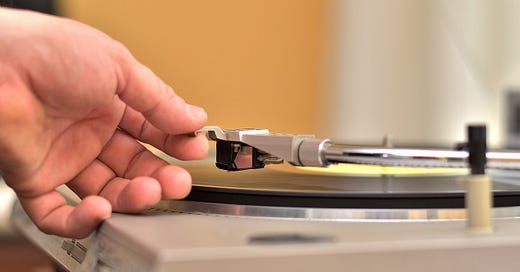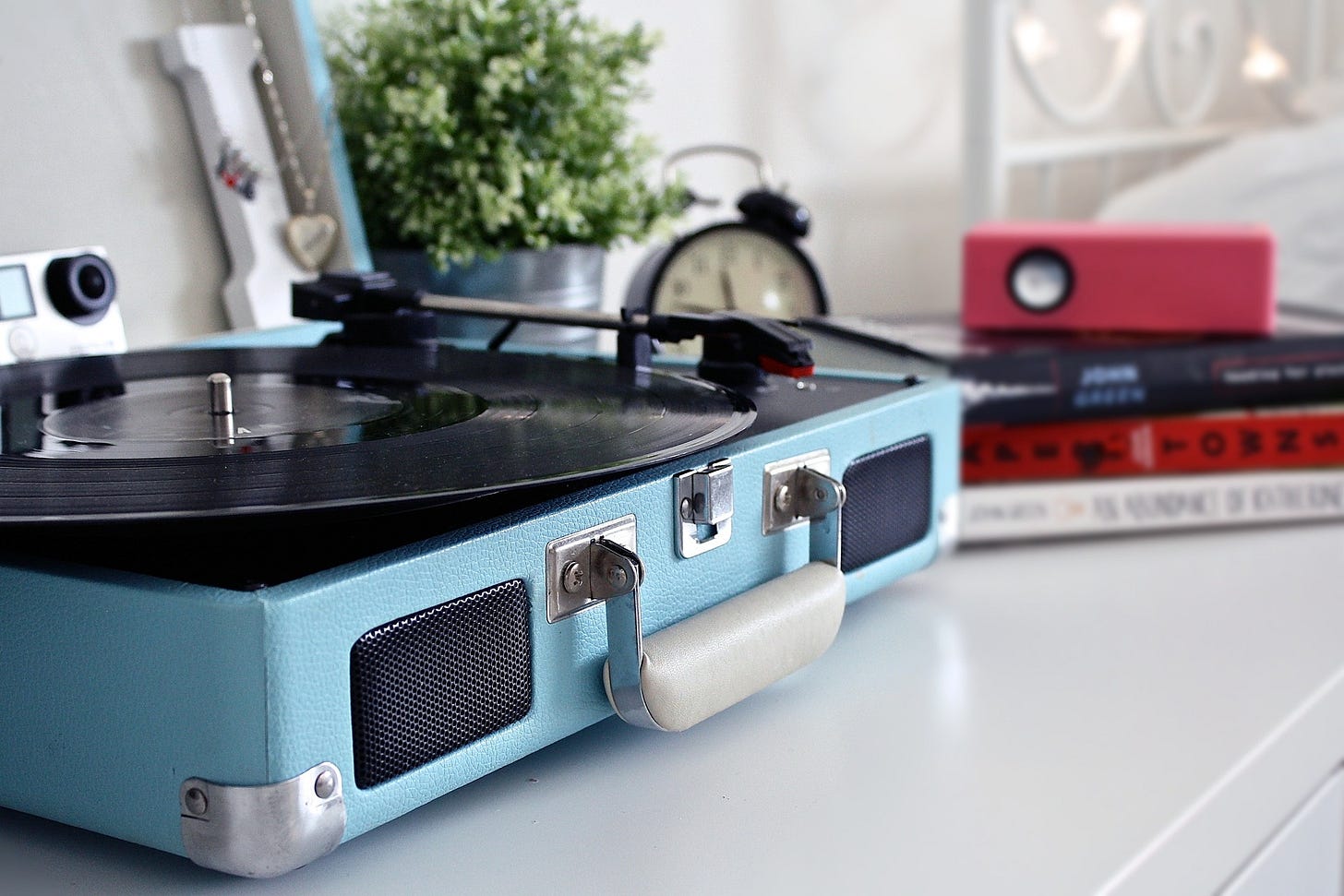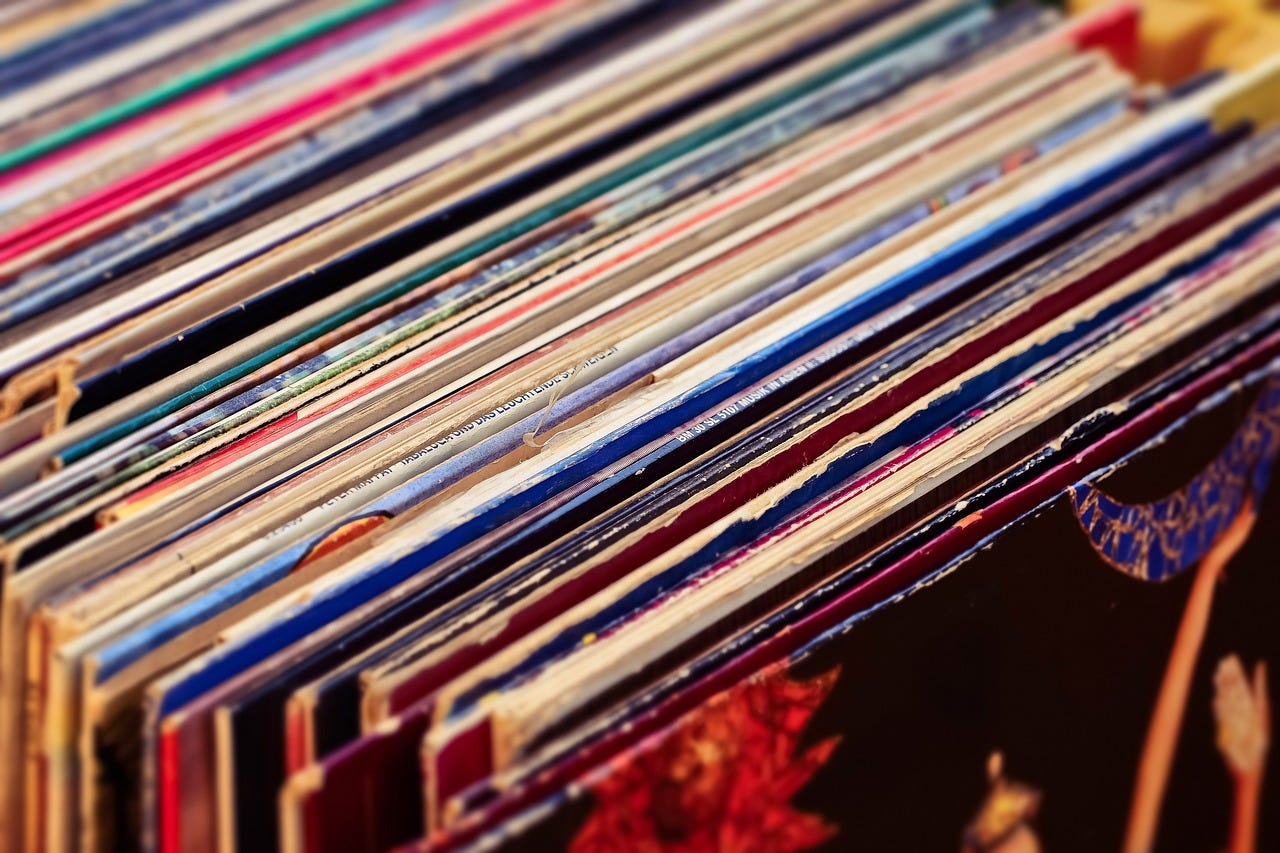Your vinyl setup and collection: the art of choosing wisely
Having a clear strategy is key to ensuring you are adding the most value to your collection from day one. Today I will be sharing some tips and pointers for newbies and experienced collectors alike.
If you’re completely new to vinyl, chances are you may not even know where to start. Unless you have used a turntable at some point in your life (or seen one in operation), this arcane machine may look a bit intimidating. At the end of the day, no other device in modern life looks anything like it!
With the vinyl revival, turntables are now back in the mainstream, which means the choice and price range are huge. Most audiophiles will warn you to stay away from all-in-one “briefcase style” turntables because they are not “the real thing” and their enticingly low prices are a clear reflection of their disgraceful quality. At the risk of dropping a controversial bomb, I wouldn’t discard them completely. There is an old adage in the hi-fi world that devices perform better when they are not integrated (i.e. one entire device should focus on playing vinyl records, another separate device should play CDs, cassette decks should be separate, you should have separate speakers, and ideally, a separate amplifier). This is indisputable. There is also a lot to be said about the extremely low quality of the tonearms and styli (needles) they come with. However, I believe there is a certain place for all-in-one integrated turntables if you are making your first steps and you are not yet sure what role vinyl will play in your life. An integrated turntable may very well be the only one you can afford. The one thing I will say though is that you should either get separate speakers or make sure the built-in speakers resemble something along the lines of real speakers. So yes, maybe don’t choose one that actually looks like a briefcase, because chances are it will sound like a briefcase.
If an integrated turntable is your only option, try not to play anything too expensive on it, and be aware that some records (especially new ones) may skip. Older, second-hand records in good condition will work best.
If you are already one step ahead with your setup, any turntable in the Audio Technica, Pro-Ject or Sony range would be ideal. These are “proper” turntables and tend to sell for affordable prices. Compared with an integrated turntable, you will notice a tremendous improvement in sound quality without breaking the bank. Bear in mind, though, that from this level onwards, you will need to get separate speakers. I would suggest you get a decent pair of standalone speakers that you can connect via cables, not via bluetooth. While I am not a purist, there is an argument to be made that bluetooth connections are not analogue and, therefore, won’t let you experience the magic of vinyl in its purest form. Plus, when you add an amplifier to your setup, the overall sound and performance of your system will improve significantly.
For the pros, and if you can afford it, a Technics turntable with a separate pre-amplifier, plus a robust amplifier and a decent pair of speakers will work best. At this level you should also be looking at which specific cartridge and stylus will be the most appropriate for your system.
If you can’t decide on a turntable, check reviews and seek expert advice, but a pragmatic solution is to go mid-range. Bear in mind that your system will have a certain lifespan, so you can always upgrade to a more sophisticated model or setup at a later stage. As always, your particular financial circumstances or space restrictions may mean you will have to make compromises here and there (and that’s okay).
How should you choose your records? Most albums will have been issued more than once, in different countries and in different years. Chances are there will be multiple releases (issues and reissues) of the same album. Anything from the golden years of vinyl (60s to 80s) from one of the main vinyl manufacturing hubs (USA, UK, Germany, Netherlands, and to some extent Canada and South Korea) is a safe bet. Japanese vinyl can be hit or miss (their specialist format is CD). The key thing to note is that, if a record is in high demand, the rarer it is, and the better its condition, the higher its value will be. In contrast to hi-fi systems, where more expensive almost always means better or more sophisticated, a more expensive vinyl record will not always necessarily sound better. A record may be poorly pressed and manufactured, or in bad condition, but if it is rare (think limited editions, misprints, and other collectible items) and in high demand, it can — and usually will — sell for hundreds or even thousands.
A great way of checking different editions of an album (both in terms of quality and value) is to search for the master release of the album on a site called Discogs. You can filter by format (vinyl, CD, etc.), country of issue and year of release, for example. On the master release page of any given album, if you scroll down to the “Reviews” section, you will be able to see comments from different collectors on different editions (specific “releases”) of the album. While some users will also comment on the music (which may or may not be relevant, depending on what you are looking for), most collectors will use this “Reviews” section to talk about sound quality. Collectors will either recommend or warn against certain editions for different reasons. Be mindful that some people can be quite purist and will always talk down reissues in favour of original releases.
The “original versus reissue” question is a hot topic in the vinyl community and you will find voices clamouring for one or the other for various reasons. Some reissues will sound worse than the original pressing, especially if done cheaply, or pressed from a digital master. In other cases, however, a reissue can be an improvement, especially if done on 180 gram vinyl when the original pressing was cheaply pressed on recycled or very thin vinyl material (this is sometimes the case with records from the 90s).
If you really like an album and want to have it on vinyl, there is a possibility that you may end up buying more than one edition of the same album, if certain details or characteristics are meaningful to you or if you spot resell value. Discogs has a marketplace section where you can see how many users want a specific release, how many users have it, and the highest, lowest and median price it sells for on the Discogs marketplace. When buying on Discogs, always check the seller’s reviews and the condition of the record. It is also a good idea to compare prices (within Discogs as well as with other virtual and physical marketplaces). You should familiarise yourself with vinyl grading (“Mint” condition means untouched, i.e. still in shrink or never played; once opened and played once, it’s already “Near Mint” even if it still looks and sounds like new; once it shows the first signs of wear but is still in good condition it’s considered “Very Good”; as the signs of wear are more noticeable it’s graded as “Good”, and so on).
Ebay is another place where you can buy and sell records online. Sellers here sometimes use a different grading system, similar to the scale physical stores tend to use (New, Like New, Excellent, Very Good, etc.).
Physical stores, especially those that sell second-hand vinyl records, can be hiding real treasures on their shelves. Even more satisfying when said treasures are unbeknownst to the shop owner. My general advice with physical stores is that, once you find the time to visit one, you should search thoroughly. While this can be time-consuming (depending on the size of the store), many people find it therapeutic, and you can’t beat the joy of finding a hidden gem when you least expect it.
If you have limited space but would potentially be interested in re-selling your vinyl at some point, you should prioritise variety over quantity. You want your pool of potential buyers to be as diverse as possible, so make sure you go across genres, years of release and countries of origin, and ensure you have a healthy combination of reissues and original pressings, coloured and standard black vinyl, and a picture disc here and there. Diversifying your target audience in advance will help you make wiser decisions today.
For experienced collectors, the main questions you should ask yourself are:
1. How will this record complement my existing collection?; and
2. How likely is it to go up in value in the future? (if I take good care of it!)
To expand a bit on the above, consider whether it is a rare edition of an album you already own, for example, which you could potentially resell for a higher price at a later stage. If you don’t own any edition of the album, would you be able to potentially sell this record to the same buyers who you know will be interested in other, perhaps more common or mainstream, records from your existing collection? For large collections, economies of scale are your best friend, as you will be able to make savings on shipping costs (something which buyers always appreciate) and/or avoid multiple trips to different record stores, if selling in person. I often find that asking yourself these questions can help you make up your mind more quickly when you are hesitating between records and you need to pick one.
I’d love to hear your thoughts in the comments. What are the main factors you consider when you choose your records? Do you prefer buying records online or visiting physical stores?
Thank you for reading and/or listening. Happy spinning!










Wow, Andres, there is so much great info here--and the way you lay things out so clearly, even the uninitiated like me can follow along. I remember my grandmother’s record player was a giant piece of furniture. The “newfangled” one my parents bought in the 80s was also furniture, but about half the size. Sadly, we never had many revords!
"...and you can’t beat the joy of finding a hidden gem when you least expect it."
Finally finding that record you've spent years looking for is one of the best feelings in the world. That happened to me recently, and I was on Cloud 9 for quite awhile.
As for my collection, 90-95% of the time, I'm looking for bands I like or have recently caught reviews on. Once in awhile the cover art alone will get me to buy.
I prefer original pressings, but don't think twice picking up a reissue- especially if it's something I just want to get home and listen to.
This was a great write up, Andres! Only thing I might add is this: If you're new to vinyl, stay off Reddit for awhile. Some Redditors are needlessly cruel. If you found a record and it makes you happy, then it was a "win," no matter what they post.